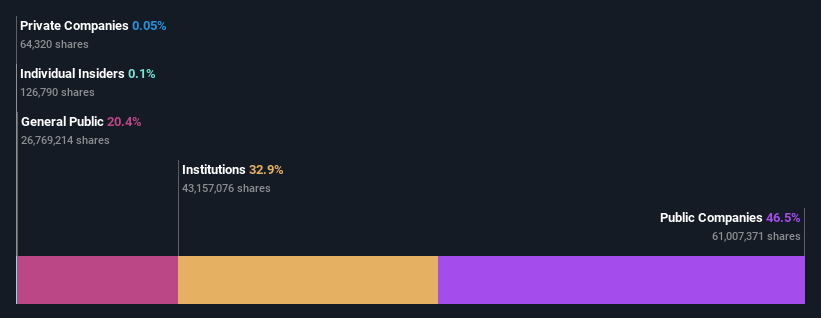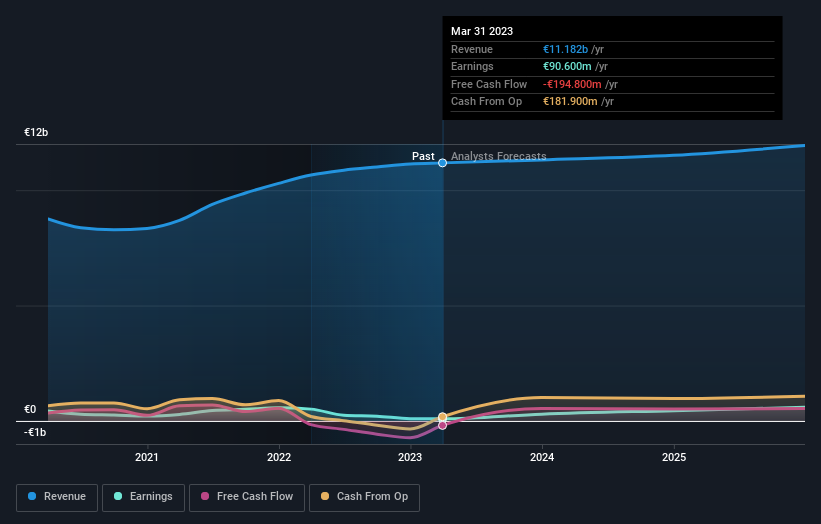KION GROUP AG's (ETR:KGX) market cap touched €4.6b last week, benefiting both public companies who own 47% as well as institutions

Key Insights
- The considerable ownership by public companies in KION GROUP indicates that they collectively have a greater say in management and business strategy
- A total of 3 investors have a majority stake in the company with 52% ownership
- Institutional ownership in KION GROUP is 33%
Every investor in KION GROUP AG (ETR:KGX) should be aware of the most powerful shareholder groups. The group holding the most number of shares in the company, around 47% to be precise, is public companies. In other words, the group stands to gain the most (or lose the most) from their investment into the company.
Following a 3.5% increase in the stock price last week, public companies profited the most, but institutions who own 33% stock also stood to gain from the increase.
Let's delve deeper into each type of owner of KION GROUP, beginning with the chart below.
Check out our latest analysis for KION GROUP

What Does The Institutional Ownership Tell Us About KION GROUP?
Many institutions measure their performance against an index that approximates the local market. So they usually pay more attention to companies that are included in major indices.
As you can see, institutional investors have a fair amount of stake in KION GROUP. This implies the analysts working for those institutions have looked at the stock and they like it. But just like anyone else, they could be wrong. It is not uncommon to see a big share price drop if two large institutional investors try to sell out of a stock at the same time. So it is worth checking the past earnings trajectory of KION GROUP, (below). Of course, keep in mind that there are other factors to consider, too.

KION GROUP is not owned by hedge funds. Our data shows that Weichai Power Co., Ltd. is the largest shareholder with 47% of shares outstanding. In comparison, the second and third largest shareholders hold about 3.2% and 2.8% of the stock.
To make our study more interesting, we found that the top 3 shareholders have a majority ownership in the company, meaning that they are powerful enough to influence the decisions of the company.
While studying institutional ownership for a company can add value to your research, it is also a good practice to research analyst recommendations to get a deeper understand of a stock's expected performance. There are plenty of analysts covering the stock, so it might be worth seeing what they are forecasting, too.
Insider Ownership Of KION GROUP
While the precise definition of an insider can be subjective, almost everyone considers board members to be insiders. The company management answer to the board and the latter should represent the interests of shareholders. Notably, sometimes top-level managers are on the board themselves.
Insider ownership is positive when it signals leadership are thinking like the true owners of the company. However, high insider ownership can also give immense power to a small group within the company. This can be negative in some circumstances.
Our data suggests that insiders own under 1% of KION GROUP AG in their own names. It is a pretty big company, so it would be possible for board members to own a meaningful interest in the company, without owning much of a proportional interest. In this case, they own around €4.5m worth of shares (at current prices). It is always good to see at least some insider ownership, but it might be worth checking if those insiders have been selling.
General Public Ownership
The general public-- including retail investors -- own 20% stake in the company, and hence can't easily be ignored. While this group can't necessarily call the shots, it can certainly have a real influence on how the company is run.
Public Company Ownership
It appears to us that public companies own 47% of KION GROUP. We can't be certain but it is quite possible this is a strategic stake. The businesses may be similar, or work together.
Next Steps:
It's always worth thinking about the different groups who own shares in a company. But to understand KION GROUP better, we need to consider many other factors. Case in point: We've spotted 2 warning signs for KION GROUP you should be aware of, and 1 of them can't be ignored.
But ultimately it is the future, not the past, that will determine how well the owners of this business will do. Therefore we think it advisable to take a look at this free report showing whether analysts are predicting a brighter future.
NB: Figures in this article are calculated using data from the last twelve months, which refer to the 12-month period ending on the last date of the month the financial statement is dated. This may not be consistent with full year annual report figures.
Valuation is complex, but we're here to simplify it.
Discover if KION GROUP might be undervalued or overvalued with our detailed analysis, featuring fair value estimates, potential risks, dividends, insider trades, and its financial condition.
Access Free AnalysisHave feedback on this article? Concerned about the content? Get in touch with us directly. Alternatively, email editorial-team (at) simplywallst.com.
This article by Simply Wall St is general in nature. We provide commentary based on historical data and analyst forecasts only using an unbiased methodology and our articles are not intended to be financial advice. It does not constitute a recommendation to buy or sell any stock, and does not take account of your objectives, or your financial situation. We aim to bring you long-term focused analysis driven by fundamental data. Note that our analysis may not factor in the latest price-sensitive company announcements or qualitative material. Simply Wall St has no position in any stocks mentioned.
About XTRA:KGX
KION GROUP
Provides industrial trucks and supply chain solutions in Western and Eastern Europe, the Middle East, Africa, North America, Central and South America, China, and the rest of the Asia Pacific.
Good value average dividend payer.
Similar Companies
Market Insights
Community Narratives



